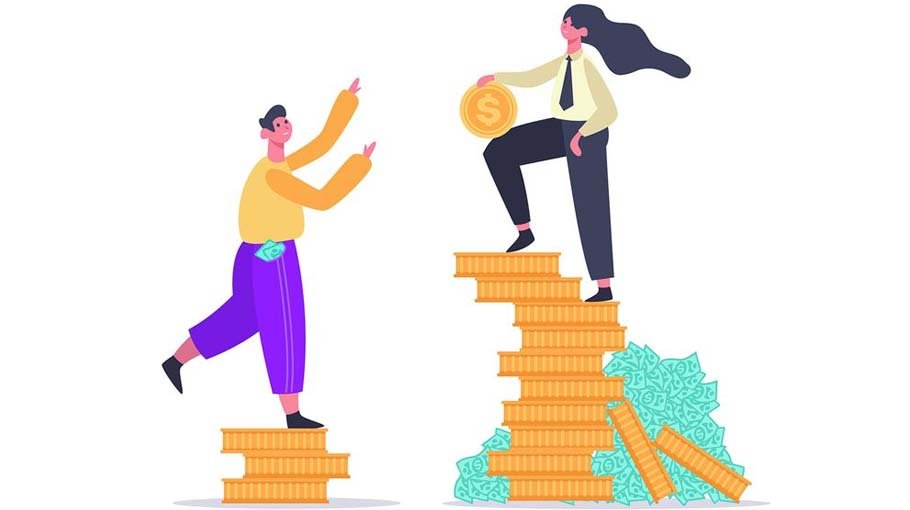Rising inequality poses a threat to world peace

There is an ongoing debate over rising income inequality and its adverse impacts on democracies. The inequality between countries is not growing as commonly assumed. This is because the annual economic growth in many developing countries is growing faster than in the industrialised developed world.
Some also argue that the rising inequality among people within a country is not universal. The gap between haves and have-nots has somewhat narrowed down in several countries in South America, North Africa and elsewhere.
No doubt, the inequality graph is neither straightforward nor universal. However, if we look at the global population and do not consider national boundaries, the world has been witnessing increasing income inequalities for the last three decades. According to a recent report by Credit Suisse, half of the world’s wealth is in the hands of only one per cent of the world’s population.
Severe economic crises
In recent decades, it has been a fact that many parts of the world witnessed a reduction in extreme poverty. In 1990 extreme poverty globally was nearly 36 per cent, and it had come down to below 10 per cent by 2020.
The UN Department of Economic and Social Affairs, in its
World Social Report 2020, points out that inequality is growing
for more than 70 per cent of the world’s population, and that is
increasing the risks of societal divisions
Rapid economic growth in a few developing countries, particularly in Asia, improved access to food, health care, education, and housing. However, during the Covid-19 pandemic, several countries faced severe economic crises that pushed millions of families into poverty again.
The globalisation process has translated into huge gains for some and losses for others. The new economy generates new wealth, but it has not benefited the poor and underprivileged sections of society equitably.
The debt burden of several developing countries has multiplied, and the gap between the per capita income ratio in developed and developing countries has widened further. The number of poor and unemployed people worldwide is at its highest level ever.
The world committed itself to 17 Sustainable Development Goals (SDG) in 2015 as a new holistic approach to achieving sustainable development and fastening implementation. The UN had declared the year 2020-2030 as the ‘Decade of Action’. While SDG 1 aims at eradicating all forms of poverty, SDG 2 calls for zero hunger by 2030.
Global hunger crisis
In 2020, between 720 and 811 million people worldwide had suffered from hunger. This number has increased further during the pandemic. Countries with high inequality are often less successful in reducing poverty and hunger than countries with lesser inequality.
The UN Department of Economic and Social Affairs, in its World Social Report 2020, points out that inequality is growing for more than 70 per cent of the world’s population, and that is increasing the risks of societal divisions and adversely affecting socioeconomic development.
Most of the democratic countries have unfortunately witnessed a rapid increase in economic inequality in recent decades. The average share of disposable income of the top 10 per cent of the population in OCED countries has grown more than nine times higher compared to the bottom 10 per cent population. The Covid-19 pandemic has further expanded the economic inequality in the last two years.
The world’s billionaires have acquired more wealth during the pandemic than they had done in the whole of last 14 years. During this time, while the wealth of the 10 richest persons doubled, the income of 99 per cent of the global population declined.
The expanding inequality has contributed significantly to the rapid rise of right-wing populism. The large group, left behind from the growth cycle feels the rules of countries are rigged in favour of the rich and powerful, so it seeks to find a way outside the existing democratic system. Those who have fallen behind often move out of the traditional parties and embrace populist forces.
There is enough evidence that economic insecurity leads to larger electoral support for populist forces and develops hostile and strong resentment against the immigrant and minority population. The decline of trust in traditional political elites also leads to increased support for populist parties and leaders.
Acute income inequality breaks the traditional political alliances in the country as populists portray it as the loss of democratic legitimacy of the ruling elites. Economic uncertainty and decline in living standards make the relatively deprived population more likely to believe the anti-elite political rhetoric of the populist forces.
Growing inequality can even lead to more conflicts in a society. The left-behind group feels relatively deprived for not having what they think they are entitled to, leading to frustration, anger, and grievances. Thus, the rising income and wealth inequality not only erodes democracies but also catalyses more and more group conflicts in a society.
Ashok Swain is a Professor of Peace and Conflict Research, at Uppsala University, Sweden. Source: Gulf News



